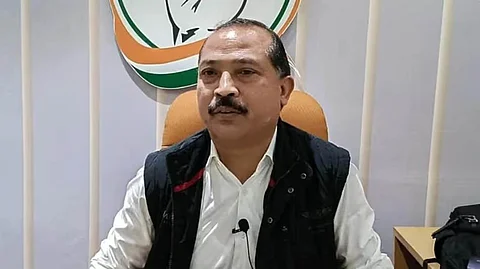
- Home
- Live Blog
- Breaking News
- Top Headlines
- Cities
- NE News
- Sentinel Media
- Sports
- Education
- Jobs

CORRESPONDENT
SHILLONG: Meghalaya Pradesh Congress Committee (MPCC) president Vincent H Pala has accused those in power of enabling and profiting from widespread illegality in the state’s coal sector, alleging that an unofficial yet “huge collection of money” on the roads has crippled lawful coal transportation. Pala claimed that despite official auctions of coal and high market demand, the government’s “gunda tax” has become so exorbitant that even successful bidders have stopped moving coal, rendering the entire system dysfunctional.
It may be mentioned that Meghalaya sold only 3,563 metric tonnes out of the 2,13,567.99 MT of coal put up for auction earlier this year, a panel report said. The sale amounts to approximately 1.67% of the total volume. On the auction of re-assessed or re-verified inventoried coal by Coal India Limited for efficacious disposal of the said coal, the Justice (retired) B.P. Katakey Committee, in its 33rd interim report, said it made several attempts to find a more reliable method to ensure the expeditious auction of such coal in the CIL’s designated depots.
“See, the report is, after all, reports only. Today, somebody gives a report saying there is coal; the report given by the Deputy Commissioner, by Police or by different agencies. Tomorrow they say this is illegal, and the day after tomorrow they say, okay, auction it. Auction has been done, but there is no transportation. These officials—we cannot say and we cannot keep on changing the data,” Pala said, accusing the government of inconsistent and manipulated coal data. “Coal India has done the auction, whereas there are no takers.”
He alleged that coal auction winners were unable to transport coal due to rampant extortion on the highways. “These people, when they got the coal from the auction, then that coal was not transported, because on the way there is a huge collection of money… the demand is high, but the government’s gunda tax is higher than the demand,” he said.
Pala further charged that private individuals were “misusing” the illicit money collected during transportation. “The government doesn’t get any revenue, but individuals get huge revenue for their personal benefit, and with that money they misuse it… they buy the leaders, and they do so many things—they build hotels, they make buildings,” he alleged.
Pointing to the continued dysfunction in the sector, he said, “Ministers today, or the people who are in power and who are looking after these things, know that so much coal is there, so many auctions has been done, so much has been lifted, and so much is to be lifted—they are aware of all. Definitely the Deputy Commissioners, Superintendents of Police, the Ministers—they definitely have all the data with them.”
Pala asserted that the mess began with the sudden halt of mining. “See, the fact about the coal is that when the National Green Tribunal stopped the coal, they stopped it suddenly. There was a huge chunk of coal, huge investment left there… and when they stopped the coal, it was stopped without proper planning,” he said, adding that the government has since failed to create any clear policy.
He alleged that illegalities have now become embedded in governance. “The government, I think, is living with illegal… illegal coal, illegal drugs, illegality in transportation of cattle. So many illegals are there. The government lives with the illegality. They encourage illegality,” Pala said. According to him, the lack of livelihood support has pushed people in the coal belts of Garo, Jaintia and Khasi Hills to continue illegal mining.
He also questioned the reliability of the data gathered by authorities. “The data which the Katakey Committee has got from the District Administrations—I don’t think they got the exact data… when coal from the jungle comes to the roadside, they say it’s new mining; it may or may not be,” he said, alleging routine mining despite drones and surveillance.
Slamming the government’s ad-hoc approach, Pala said, “There was no proper system of doing it. Last time, they transferred the SP from Jaintia Hills, but today, again, the coal is there… people have been mining for the last 50–60 years. So you cannot just stop like that without proper rehabilitation, a proper system, a proper policy. So the government doesn’t have a proper policy, that’s why all these things happen.”
Also Read: NGOs Warn of Illegal Mining Near South Garo Hills’ Fragile Zones